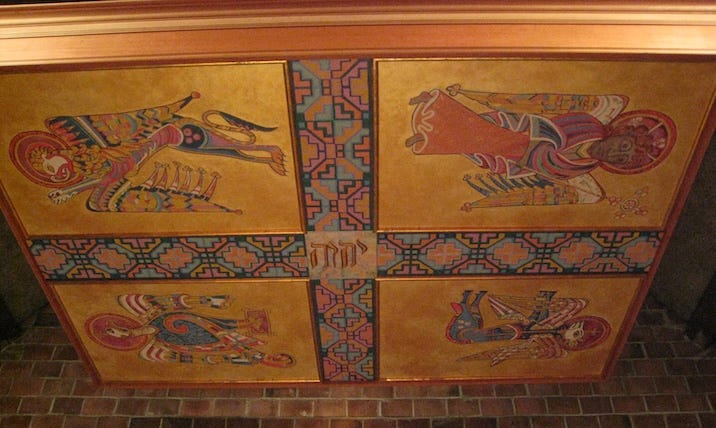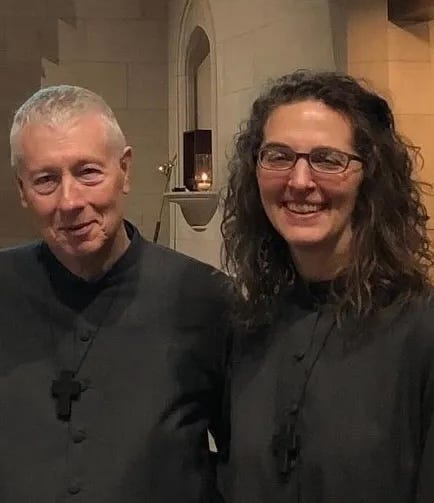The Renewal - Apostolate Cycle
It is simply what happens
Today’s post is selected parts of An Energy Not its Own: Three Cycles of Parish Life and the Purposes of the Parish Church, Michelle Heyne and Robert Gallagher. From Chapter 4 “The Renewal - Apostolate Cycle.”
From the Vision of God to Daily Life
We’re talking about nothing less than the parish church being a pathway to the vision of God and, also, facilitating the movement of parishioners between that vision and their daily lives. It is fundamentally about growth in holiness and how that holiness enters the world through individual parishioners. …
You may find it useful to have a one page PDF of the model as you read the article - The Renewal - Apostolate Cycle
It is simply what happens
This model illustrates what is happening week after week as we come together in worship, education, and community. We are being renewed in our baptismal identity and purpose. As we encounter the living God in the Eucharist and with our fellow parishioners, we are transformed. And we take that transformation with us as we reenter daily life. Because we have been transformed, our relationships to the world are transformed. This doesn’t have anything to do with being explicitly “evangelical” or using religious language. It is simply what happens. As each of us grows in holiness, we are able to bring that holiness to our families, friends, and workplaces. We are able to bring it to our volunteer work, and our civic life. As we’ve said, the process is organic. It happens whether we know it or not. And at the same time, there is enormous power in knowing that Sunday morning is not an isolated activity, something set aside from “real life.” In knowing that our service begins when we leave the church, not when we enter it. In knowing that God is working in and through us in all aspects of our life and in all of our interactions. This is also quite humbling. …
The Renewal—Apostolate Cycle assumes that holiness of life overflows in lives of love and service. It describes the primary rhythm of the Christian life as the parish community gathers to be renewed in baptismal identity, primarily in worship, and also in formation and community life, and then is dispersed, with each person going back out into their daily lives, as part of other communities and institutions. The Renewal—Apostolate Cycle describes a process of being fed and then feeding others. We are loved and we love. To the extent the Spirit has made us salt and light, we will be salt and light with friends and family, in our work and civic life. Worship of God reminds us of who and whose we are. It re-orders the universe. As Augustine said, “Behold who you are, become what you receive!”
The Vision of God
In The Vision of God, K. E. Kirk explores the classic orthodox statement that “the end of man is the vision of God,” and states that “the doctrine … has throughout been interpreted by Christian thought at its best as implying in practice that the highest prerogative of the Christian, in this life and the next, is worship; and that nowhere except in this activity will he find the key to his ethical problems.”
This dovetails with Martin Thornton’s statement that “we do not embrace religion primarily to improve our morals, but rather undertake the moral struggle in order to improve our Prayer. However interdependent the two may become, the end of man is not purity of heart but the vision of God. The best way to attain the former is by aiming purposefully at the latter.”45 A related Thornton statement is, “Moral action only flows from doctrinal truth by grace and faith, that is through prayer.” …
Experience this faith from the “inside”
“Conversion of mind” or the capacity to view everything afresh with the eyes of faith is one aspect of conversion. Catechesis also begins the process of learning distinctly Christian habits, practices, and virtues. This formation cannot be hurried. It takes time to learn a new way of thinking and to unlearn old habits of mind and behavior. New Christians and their sponsors need to understand the faith articulated in the creeds, grasp its internal coherence, and experience this faith from the “inside”—as an inner dynamic creating order, insight, beauty, and direction in one’s life. Christian formation also entails shedding obsolete and defeating patterns of thought and conduct. (From Julia Gatta’s Life in Christ: Practicing Christian Spirituality) …
In thinking strategically about formation, leaders do well to remember that the congregation is always made up of people in different places in their spiritual lives, and we never quite know when someone will be especially open to the Holy Spirit’s movement in their life. It’s therefore important that parish formation opportunities respond to where people actually are, while continuing to invite further development and greater depth. They must also be frequent enough, and both flexible and comprehensive enough, to provide entry points to both newcomers and long-term members. They also have to be consistent with the parish’s capacities. …
The parish’s culture
All parishes have a culture. That culture is expressed in and created by its liturgy and music, its community life and formation work, its clergy, and its sacramental and prayer life. That is the soil in which people may grow as “free, responsible beings united in love.” In Ephesians we read, “until all of us come to the unity of the faith and of the knowledge of the Son of God, to maturity, to the measure of the full stature of Christ” (4:13).
Developing maturity is a central part of the parish’s work and contributes to a healthy Renewal—Apostolate Cycle. There are many descriptions of the mature Christian. Henri Nouwen wrote of solitude, hospitality, and prayer. The Prayer Book, in the baptismal rite, asks that the candidate be given “an inquiring and discerning heart, the courage to will and to persevere, a spirit to know and to love you, and the gift of joy and wonder in all your works.” There’s also growth in the four cardinal virtues—prudence, justice, fortitude, and temperance. Each of us can add our own favorite descriptor of Christian maturity. How likely we are to develop in the direction of the full stature of Christ rests to some degree on the parish’s culture. If maturity includes solitude, is the parish a community in which solitude is nurtured and lived? If maturity includes an inquiring and discerning heart, is the parish a place in which people are free to speak the truth they know at this time in their life, hear that of others, and enter into the humility of waiting upon the Spirit? If maturity includes prudence, that capacity for sound judgment grounded in reality and directed toward what is good, is that the way the parish lives? Is emotional and social intelligence fostered? Is this parish effectively renewing people in their baptismal identity and purpose? Are we the soil that grows saints?
Give thanks to the Lord and call upon his Name; *
make known his deeds among the peoples.
Sing to him, sing praises to him, *
and speak of all his marvelous works.
Glory in his holy Name; *
let the hearts of those who seek the Lord rejoice.
Search for the Lord and his strength; *
continually seek his face.
Psalm 105: 1-4 Confitemini Domino
This abides,
Sister Michelle, OA & Brother Robert, OA
A 12 minute video - The Renewal - Apostolate Cycle - Video presentation
Assessments based on the model
Renewal-Apostolate Cycle - an overall parish assessment
Renewal-Apostolate Analysis Renewal-Apostolate Analysis #2
Renewal-Apostolate Cycle - Rule of Life Worksheet
Renewal-Apostolate Cycle distorting tendencies -ways in which the parish can cut across the Cycle
Interview Questions - a worksheet (Rooted in the Renewal - Apostolate Cycle)




